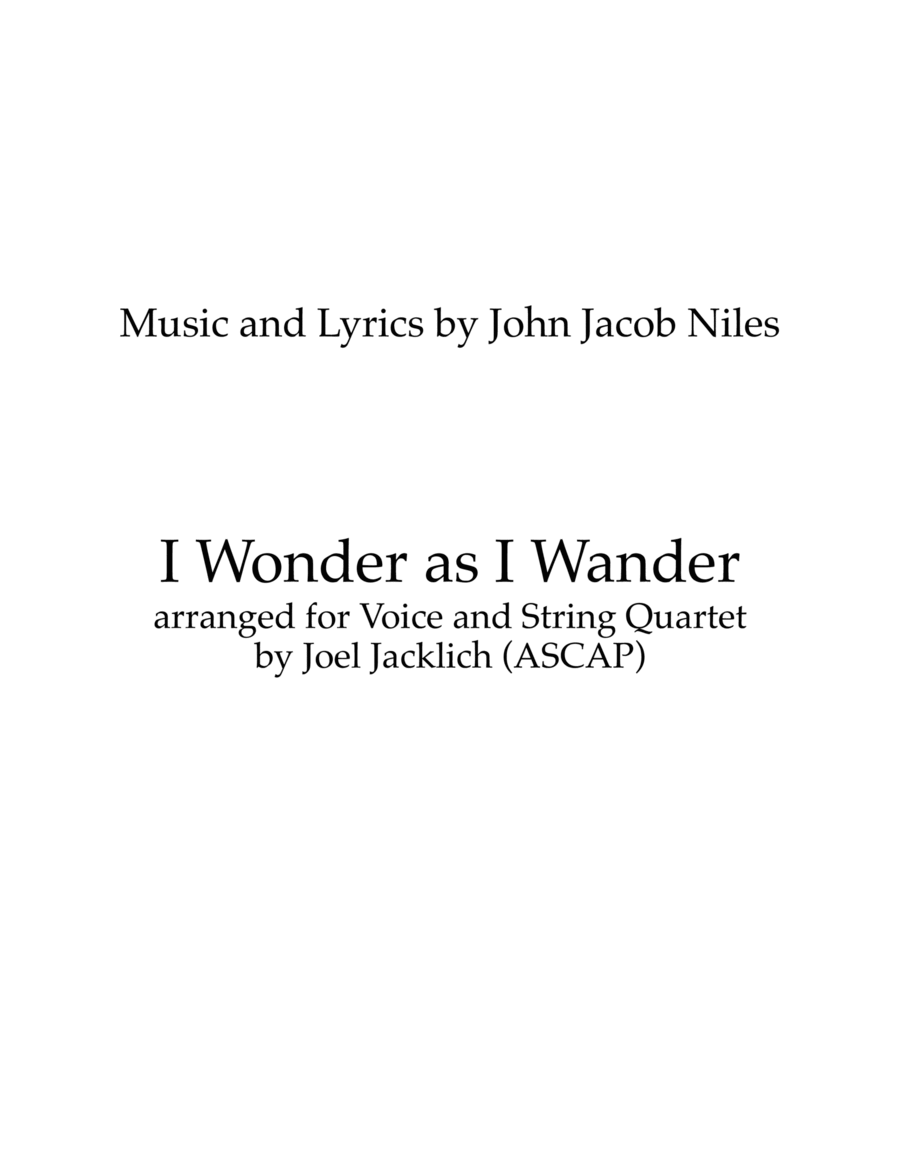String Quartet Cello,String Quartet,Viola,Violin - Level 3 - Digital Download SKU: A0.1312368 Composed by John Jacob Niles. Arranged by Joel Jacklich (ASCAP). Chamber,Christmas,Folk,Holiday,Traditional. 11 pages. Joel Jacklich #901221. Published by Joel Jacklich (A0.1312368). I Wonder as I Wander by John Jacob Niles is here arranged by Joel Jacklich (ASCAP) for voice and string quartet.Ã Wonder as I Wander nis a Christian folk hymn, typically performed as a Christmas carol, written by American folklorist and singer John Jacob Niles. The hymn has its origins in a song fragment collected by Niles on July 16, 1933.[1][2][3][4][5]While in the town of Murphy in Appalachian North Carolina, Niles attended a fundraising meeting held by evangelicals who had been ordered out of town by the police.[1][5] In his unpublished autobiography, he wrote of hearing the song:A girl had stepped out to the edge of the little platform attached to the automobile. She began to sing. Her clothes were unbelievable dirty and ragged, and she, too, was unwashed. Her ash-blond hair hung down in long skeins. ... But, best of all, she was beautiful, and in her untutored way, she could sing. She smiled as she sang, smiled rather sadly, and sang only a single line of a song.[2]The girl, named Annie Morgan, repeated the fragment seven times in exchange for a quarter per performance, and Niles left with three lines of verse, a garbled fragment of melodic materialâand a magnificent idea.[2][5] (In various accounts of this story, Niles hears between one and three lines of the song.[2][4][5][6]) Based on this fragment, Niles composed the version of I Wonder as I Wander that is known today, extending the melody to four lines and the lyrics to three stanzas.[2][3][5] His composition was completed on October 4, 1933.[2] Niles first performed the song on December 19, 1933, at the John C. Campbell Folk School in Brasstown, North Carolina.[2][6] It was originally published in Songs of the Hill Folk in 1934.[4][6]References1. Bradley, Ian. The Penguin Book of Carols. Penguin (1999), p148. ISBN 0-14-027526-6.2. Pen, Ron. I Wonder as I Wander. A Kentucky Christmas (George Ella Lyon, editor). University Press of Kentucky (2003), p200â201. ISBN 0-8131-2279-1.3. Studwell, William E. The Christmas Carol Reader. Haworth Press (1995), p111. ISBN 1-56024-974-9.4. Emmons, Shirlee & Wilbur Watkin Lewis. Researching the Song: A Lexicon. Oxford University Press (2006), p242. ISBN 0-19-515202-6.5. Niles, John Jacob. I Wonder as I Wander. Archived 2006-03-25 at the Wayback Machine John-Jacob-Niles.com.6. Stulken, Marilyn K. With One Voice: Reference Companion. Augsburg Fortress (2000), p25. ISBN 0-8066-3843-5.Program Notes from Wikipedia.
